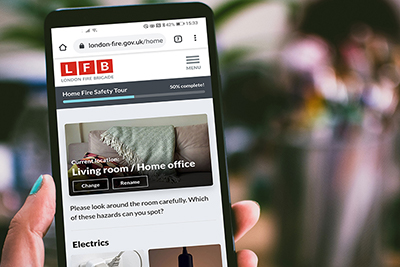Why is it important?
Fire alarm systems save lives
Smoke and heat alarms can save lives. Every home should have alarms fitted on the ceiling in all areas of risk and should be tested regularly. However, vulnerable people might need different kinds of alarms to keep them safe. These might include:
- Alarms linked to Telecare.
- Specialist alarms like strobe lights and vibrating pad alarms for those who are deaf or hard of hearing.
Read on to learn more about specialist alarms and Telecare.
What is a specialist alarm?
Group Manager for Community Safety, Mark Hazelton, gives some advice for carers on alarms.
Understanding and reducing the risks
Smoke alarm or heat alarm?
Heat alarms are best for kitchens and smoke alarms can be fitted in most other rooms except for the bathroom, as steam from the hot water could cause false alarms.
Things to be aware of if you care for someone vulnerable
- Make sure alarms are interlinked – so that when one alarm detects a fire they all go off together, giving the person early warning.
- Make sure Telecare systems are always linked to fire alarms
- Specialist strobe light and vibrating pad alarms are available for people who are deaf or hard of hearing
- Automatic water systems such as sprinklers could be needed for people who may not be able to escape easily.
All about Telecare – what is it and how does it help?
What is Telecare?
An alarm system that can help people to continue to live independently by allowing someone else – typically a call centre or a relative who lives elsewhere – to make sure a person is safe.
The NHS website has a good overview of what Telecare is and how it works – take a look.
Be aware of Telecare best practice
Telecare systems should be linked to smoke alarms as standard. However, there are also some other areas of best practice that you should be aware of:
- Smoke alarms should be fitted in all areas where a fire can start: this includes bedrooms and lounges. A heat alarm should be installed in the kitchen.
- Fatal fire reviews reveal that the standard 'box and button approach' to Telecare, where one lifeline and one pendant are provided to vulnerable people is ineffective when it comes to life protection. By linking fire alarms to Telecare as standard, delays in calling the Brigade are limited, reducing the likelihood of injury or death occurring as a result of a fire.
- Fire alarms linked to Telecare should be tested once a month and maintained according to the manufacturer’s instructions.
- Free Telecare training is available for Alarm Receiving Centres and Fire Alarm Monitoring Organisations. Please contact us for more information by emailing AssistedLivingTechnology@london-fire.gov.uk
- Free online fire safety in the home training developed in partnership with the Telecare Services Association (TSA) is available. This aims to raise awareness, and increase knowledge of how to recognise what may present a fire risk, what you as an individual can do to minimize that risk, and possible solution.
Getting extra help
Want more advice?
There is a separate page for healthcare equipment including oxygen therapy, dynamic airflow pressure relieving mattresses and incontinence products. There's information about emollient creams here, and specialist advice to support smokers here.
Book a free home fire safety visit
We can also provide more specialist advice based on the person you care for's home and individual needs during a home fire safety visit.
They can be arranged 24/7, and we even fit free smoke alarms if the person you care for needs them. Specialist alarms can also be fitted – for example, strobe light and vibrating pad alarms for those who are deaf or hard of hearing.

Worried about someone you care for?
We have a simple tool that can guide you around the home helping you spot fire risks, or we can carry out a visit ourselves.
